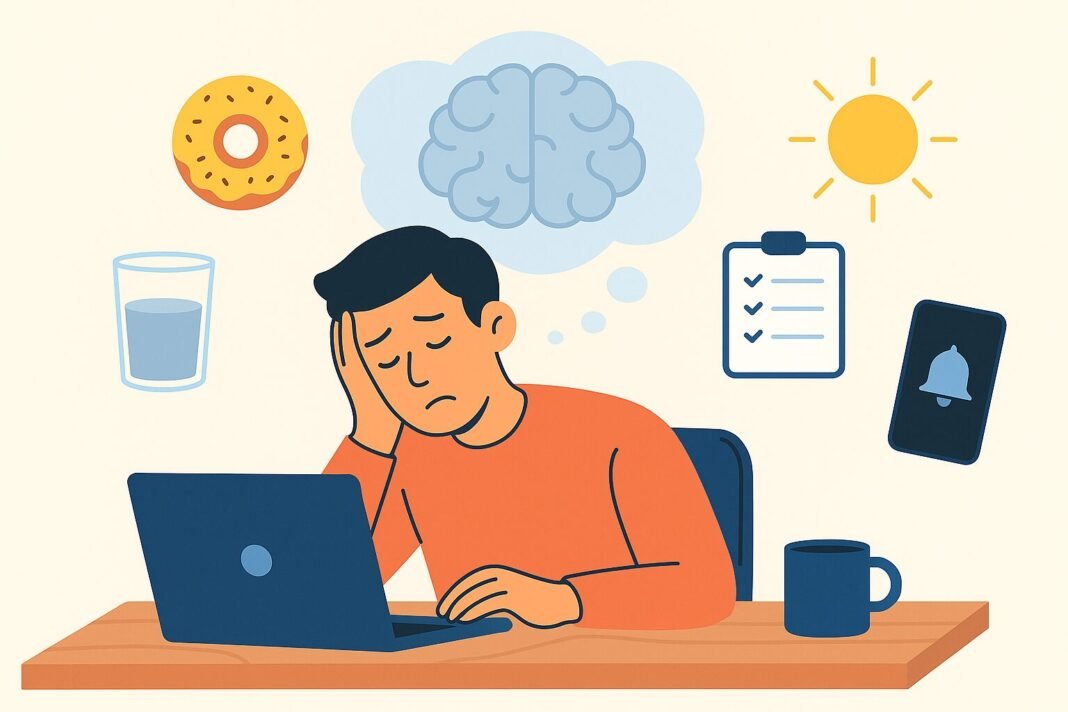Table of Contents
Intro
Hidden Causes of Brain Fog : Ever sit at your desk, open your browser, and suddenly forget what you were about to do? You’re not tired, exactly. You’ve had coffee. You slept (okay-ish). But your mind feels like it’s running in low-res mode.
That fuzzy, scattered feeling? That’s brain fog—and it doesn’t always come from obvious causes like lack of sleep or burnout. In fact, there may be several sneaky triggers hiding in your daily routine. In this article, we’ll break down 5 hidden causes of brain fog you might be ignoring—and what to do about them.
Why This Matters
Brain fog isn’t just annoying. Over time, it can chip away at your productivity, creativity, and even confidence. And while many people blame stress or sleep alone, research shows your mental clarity can also be disrupted by things like inflammation, blood sugar dips, overstimulation, or even your diet.
The worst part? These hidden causes often don’t feel dramatic enough to raise red flags. But they stack up. And recognizing them is the first step toward regaining a sharper, more energized brain.
Signs This May Be Affecting You
Here are a few signals you might be dealing with subtle, lifestyle-based brain fog:
- You get drowsy or irritable mid-morning or mid-afternoon, even with decent sleep
- You reread the same line of text three times
- You feel “off” but can’t explain why
- You constantly reach for sugar or caffeine to “fix” it
- You forget small things—like what tab you opened or why you walked into a room
The Connection Between Daily Habits and Brain Fog
Let’s break down the science—without getting too nerdy.
Many hidden brain fog triggers are tied to blood sugar regulation, inflammation, or neurochemical imbalance. For example:
- Blood sugar dips (from skipping meals or carb-heavy snacks) can lead to mental fatigue and sluggishness.
- Low-grade inflammation, often caused by processed foods or chronic stress, has been shown to impair cognitive function.
- Dopamine overload from multitasking or excessive screen time can dull your brain’s reward system, making even basic tasks feel harder.
A 2015 study in Frontiers in Psychology found that chronic low-grade inflammation can significantly disrupt attention and memory. Another paper in Nutritional Neuroscience highlights how even mild nutrient deficiencies can affect mental sharpness.
What You Can Do About It
Here are five hidden brain fog causes—and how to fix them:
1. Skipping Protein in the Morning
Many people start the day with toast or cereal—high carb, low nutrient. The result? A blood sugar spike, followed by a crash around 10:30 AM.
Fix: Add 15–20g of protein to your breakfast. Eggs, Greek yogurt, or a protein smoothie can help stabilize energy and keep your brain alert.
2. Dehydration (Even Mild)
Even 1–2% dehydration can impair concentration, according to multiple studies. Yet many of us forget to hydrate until we’re already foggy.
Fix: Start your day with a full glass of water—before caffeine. Add a pinch of sea salt or lemon to improve absorption.
3. Too Much Dopamine from Screens
Endless scrolling, multitasking, and app-switching train your brain to seek constant novelty. Over time, this reduces your ability to focus deeply on one task.
Fix: Try a “dopamine fast” window—at least 30–60 minutes in the morning without social media or notifications.
4. Messy Mental Overload
Your brain has a limited daily budget for decision-making and attention. When it’s cluttered with open tasks or worries, your clarity drops.
Fix: Try a 3-minute brain dump each morning. Write everything on your mind, no filter. This clears mental space and primes your focus.
5. Environmental Fog (Lighting, Air, Posture)
Harsh artificial light, poor air circulation, or sitting slouched for hours can all drain mental energy subtly.
Fix: Open a window, stretch every 60 minutes, and get 5–10 minutes of natural light before noon.
Table: Brain Fog Triggers vs. Clear Mind Alternatives
| Fog Trigger | Alternative | Why It Helps |
|---|---|---|
| Sugary breakfast | Protein + healthy fats | Stabilizes blood sugar |
| Skipping water | Salted lemon water | Supports hydration + minerals |
| Scrolling TikTok | 10 min walk outside | Resets dopamine + clears mind |
| Task overload | 3-min brain dump | Frees up working memory |
| Artificial lighting | Natural sunlight | Aligns body’s rhythm |
Conclusion
You don’t need a complete lifestyle overhaul to lift brain fog. Often, just a few subtle tweaks—like drinking water earlier, adding protein to your breakfast, or closing a few tabs—can help restore mental clarity.
Try just one change this week. Notice what shifts. And remember—your brain isn’t broken. It’s just signaling that it needs a reset.
Want more daily mental clarity tips? Subscribe to Daily Mind Boost.
Need a full reset? Read: What Is Brain Fog? Symptoms, Causes & How to Clear It





